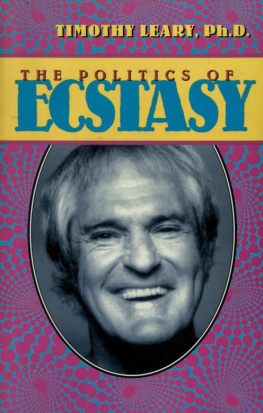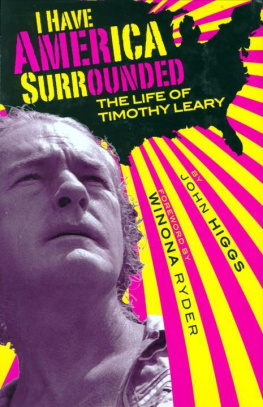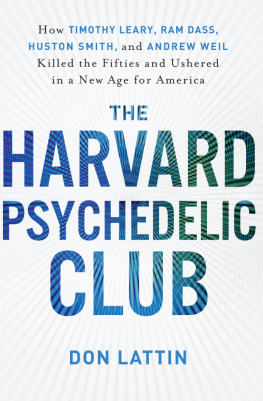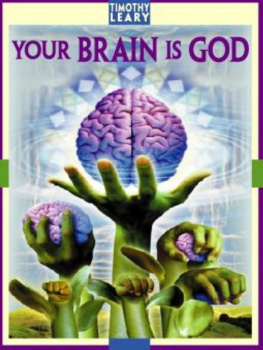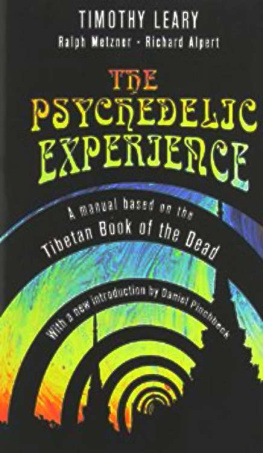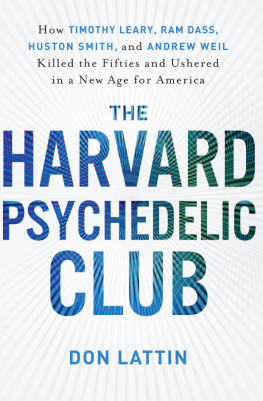In religion the future is behind us.
Three months after I was born, my dad, who was Tims archivist, went to see him in Switzerland, where Tim was living in exile after escaping prison and being called the most dangerous man in the world by President Richard Nixon, who was furiously trying to hunt him down.
My dad and Tim took acid and went skiing, and my dad pulled out a picture of methe first one ever taken (I was a day old)and showed it to Tim and asked if he would be my godfather. Tim said: Sure.
We didnt meet until seven years later, after Tim was released from prison and came to visit us on our commune in Mendocino County We were walking along a dusty road on a remote mountain ridge. It was sunset and we were holding hands. I looked up at him and said: They say youre a mad scientist.
Tim smiled and said: I know. I think he liked the sound of that.
Around the time I became a teenager I wanted to be a writer. This, of course, thrilled Tim and we talked constantly about books. My favourite literary character was Holden Caulfield; his was Huck Finn. We talked about the similarities between the two charactersespecially their feelings of alienation from polite society. I wanted to catch all the kids falling off the cliff and Tim wanted to light out for the territory. It was a time when I was in my first throes of adolescence and experiencing that kind of alienation. And talking to Tim was the light at the end of the tunnel.
He really understood my generation. He called us free agents in the Age of Information.
What I learnt from Tim didnt have anything to do with drugs, but it had everything to do with getting high. His die-hard fascination with the human brain was not all about altering it, but about using it to its fullest. And he showed us that that processthat journeywas our most important onehowever we did it, as long as we did it. You are the owner and operator of your brain, he reminded us.
Tim was a huge influence on menot just with his revolutionary ideas about human potential, but as someone who read me stories, encouraged me, took me to baseball gamesyou know, godfather stuff. He was the first person outside my familywho you never tend to believe while growing upto make me believe I could do anything. He had an incredible way of making you feel special and completely supported.
F. Scott Fitzgerald wrote a letter to his daughter in which he said that he hoped his life had achieved some sort of epic grandeur. Tims life wasnt some sort of epic grandeur. It was flat out epic grandeur.
Its easy sometimes to get lost in all the drug stuff that Tims famous forall the Turn on, tune in, and drop out stuff, especially in a society that loves a sound bite. But it wasnt Tims only legacy. It was his vitality, enthusiasm, curiosity, humour and humanity that made Tim greatand those are the real ingredients of a mad scientist.
Winona Ryder
Delivered at Timothy Learys memorial service
9 June 1996, Santa Monica, California
C HAPTER 1
Ill Free You, My Love
The signal that the jailbreak could go ahead was a telegram. It arrived on the afternoon of Friday, 11 September 1970, while Dr Timothy Leary was exercising in the prison yard. He was called into the control office and handed a slip of yellow paper that read:
BELOVEDOPERATION TOMORROW
DOCTORS FEEL BEST NOT TO WAIT
TOTALLY OPTIMISTIC ABOUT SUCCESS
AND NEW LIFE DONT WORRY ILL BE
BRAVE WONT BE DOWN TO VISIT
SUNDAY BUT WELL BE TOGETHER
SOON I AWAIT YOU I LOVE YOU
CONTACT ME AT THREE TREE
RECOVERY CENTER.
YOUR MATE
The sergeant who had handed him the telegram had done so with a look of sympathy. The message was from Tims wife Rosemary, and inmates always reacted badly to cancelled visits. Tim nodded and kept his face blank.
The telegram confirmed that arrangements for the necessary cars, drivers, safe houses and fake identity papers were complete, and that the operation could go ahead the following night. The three trees mentioned at the end of the telegram referred to the rendezvous. This was a group of trees, joined at the root, which stood a few hundred yards outside the penitentiary. If Tim could get himself outside the prison and reach the three trees, he would find a car waiting to take him to freedom. The symbolism was ideal, for Leary had Irish blood, and a group of three trees, always in fruit, was a symbol of unstoppable life in ancient Irish myths.
The stakes were high. If he did not reach the trees, there was little hope that he would ever be a free man. Leary had just been informed that he would be flown to Poughkeepsie in New York State the following week, where he would face further charges relating to the raid on his house in Millbrook nearly five years earlier. The likelihood of receiving more jail time was strong. This would destroy any hope that he had of escape, for this extra time would almost certainly trigger a transfer to a higher security prison. If he were to break out, it had to be Saturday or never. But that Friday the sky was a brilliant blue. His plan needed a foggy night in order to succeed. Without fog, there would be times during the escape that he would be silhouetted in the sights of the gun trucks and the armed guards. Without fog, only a miracle could prevent him from being shot.
He spent the following afternoon in the television room, watching the Stanford-Arkansas football game, and returned to his cell for the 4 p.m. head count. At 4.30 the whistle blew to signify the end of the count, and he waited for his cellmate to go to the food hall. Tim declined to join him, saying that he had eaten on the early line. The moment that his cellmate left, he got to work.
He opened his locker. He removed the white laces from his sneakers and replaced them with dark ones. Then he sat down in front of the locker, a newspaper across his lap, and painted out the white stripes on his shoes and handball gloves with black dye. There was a sudden jangle of keys outside his cell door, and he quickly stuffed the shoes back in the locker. His heart was pounding as he sat motionless, listening to the guard move slowly away. By the time that it was safe to retrieve the shoes and return to work, he was sweating. He was rushing now, and his hands got covered in the dye. He wiped them on his handball gloves and shoved them back in the locker with the sneakers. Then he moved to the sink, where he began to scrub the black paint off his hands with a wire brush. He used his towel to mop the spilled paint off the floor in front of the locker. Finally, he hid the stained towel under his mattress.
There could be no going back now that his escape preparations were under way. He would not be able to explain why he had painted out the white on his gloves and shoes. He had crossed the line. He returned to his bunk and wrote what, at first glance, appears to have been an extraordinarily self-righteous farewell note to the guards. In the name of the Father and the Mother and the Holy Ghost, it read, Oh, GuardsI leave now for freedom. I pray that you will free yourselves. To hold man captive is a crime against humanity and a sin against God. Oh, Guards, you are criminals and sinners. Cut it loose. Be Free. Amen. Those who knew Leary well could recognize his sense of humour at work here, but everyone else could be forgiven for seeing only the arrogance and ego that so annoyed his enemies.


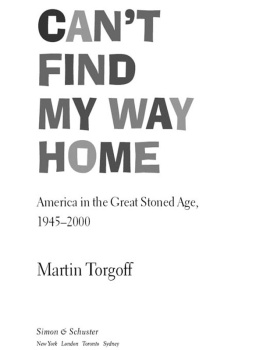
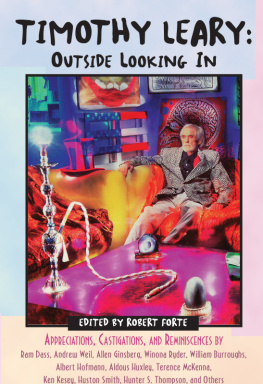
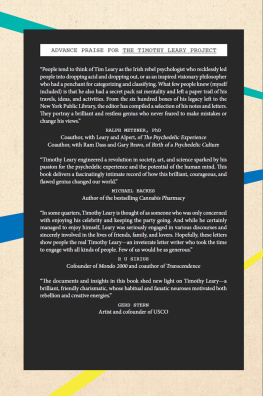
![Robert Greenfield - Timothy Leary: A Biography [excerpts]](/uploads/posts/book/113331/thumbs/robert-greenfield-timothy-leary-a-biography.jpg)
